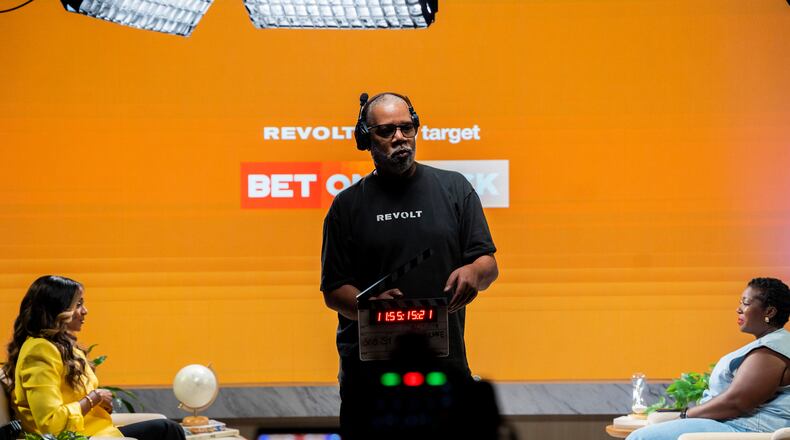On a soundstage in the heart of Midtown this August, Brit Kirkland and Devin McGhee Kirkland were getting tips on how to best present their Atlanta-based wellness startup, Deon Libra, to a panel of judges.
At stake: $200,000.
That money could mean bringing on employees for the first time to help grow their fledgling business, and being able to host events and work on getting more customers.
“I say I run a stress-care brand, and I’m the most stressed-out person I know,” McGhee Kirkland told The Atlanta Journal-Constitution. “We need to hire help.”
Credit: Handout
Credit: Handout
But first, the two entrepreneurs would have to win a payout through a “Shark Tank”-style show, pitching their business to a panel of beauty business experts.
Deon Libra was one of six companies — two of which are from metro Atlanta — that competed on this season of “Bet on Black,” a competition show on REVOLT TV that highlights Black-owned businesses. The Atlanta Journal-Constitution got an exclusive behind-the-scenes look at season four, which is focused on beauty entrepreneurs.
REVOLT TV was founded by music mogul Sean “Diddy” Combs in 2013 as a network for Black culture. It is headquartered in Midtown and is now owned by its employees after Combs sold his stake in the wake of a March federal raid on his homes. He has since been charged with racketeering and sex trafficking.
Credit: Olivia Bowdoin
Credit: Olivia Bowdoin
“Bet on Black” first aired in 2022 and gives Black entrepreneurs the chance to win life-changing money for their business. A key difference from “Shark Tank” is that the entrepreneurs don’t have to give up any equity in their business to get the funding. The $200,000 is a grant funded by one of the show’s sponsors, Target.
The show also gives the entrepreneurs a chance to sit down with experts in their field through mentor sessions filmed a few days before they have to pitch.
This season, the mentors were Adrienne Lofton, global vice president of consumer marketing at Google; Melissa Butler, founder of lipstick brand The Lip Bar (and a former contestant on “Shark Tank”); and Kari Williams, a celebrity hairstylist who also serves as the director of education for Beyoncé’s hair care line.
Credit: Handout
Credit: Handout
Tiffini Gatlin, founder of Lithia Springs-based nontoxic braiding hair company Latched & Hooked, said she was drawn to the show not only because of the chance to win non-dilutive funding but because “they included these seasoned business owners to come in and give you some great advice.”
“Most of us wouldn’t even be able to afford to go one-on-one with most of the people that they’re putting in front of us,” Gatlin said.
The mentor sessions provided a chance for entrepreneurs to ask unscripted, burning questions to successful women, often going longer than producers had planned. The mentors got to share some of their wisdom with entrepreneurs who are trying hard to grow their companies.
Credit: Olivia Bowdoin
Credit: Olivia Bowdoin
“I should be working right now, and I stopped everything to be here,” Lofton from Google told the AJC during a break in filming. Google was one of this season’s sponsors. “Being able to have side conversations after our on-set moments to … give hugs and push them forward is why I do this.”
On a set awash in warm hues, Kirkland and McGhee Kirkland, the spouses behind Deon Libra, sat down with Butler, the founder of The Lip Bar, and asked in-depth questions about marketing strategies and whether to do a deal with a large retailer without having employees, a challenge they are currently facing.
“You don’t want to sign up for more than you can actually handle,” Butler, whose products are sold in Target, Walmart and more, told them. “You will need people … You will need money for the inventory. You will need money for marketing. So, you will have to do your due diligence.”
Credit: handout
Credit: handout
Pitches were filmed at Georgia Public Broadcasting studios on an earth-tone set filled with greenery and hosted by social media influencer Pretty Vee. The judges included entrepreneurs like Monique Rodriguez, founder of the hair care brand Mielle Organics that she sold to Procter & Gamble in 2023, and actress and founder Julissa Bermudez.
During her pitch, Gatlin from Latched & Hooked explained how she was inspired to start her business when her daughter broke out after getting braids installed, and showed off her products.
Credit: Handout
Credit: Handout
“That’s a lot of hair! You’re getting your bang for your buck,” one of the judges said.
Gatlin broke down her profit margins, the challenges she’s faced and how she would use the $200,000 if she won.
After she walked off set, the judges conferred and indicated they were impressed by her business, but five other companies still had to pitch, including Deon Libra.
But all the founders ultimately walk away with funding. Those who don’t win the grand prize still get a grant, ranging from $20,000 to $75,000. The four-episode season will air starting Oct. 14.
The Atlanta Journal-Constitution and Report for America are partnering to add more journalists to cover topics important to our community. Please help us fund this important work here.
About the Author
Keep Reading
The Latest
Featured








